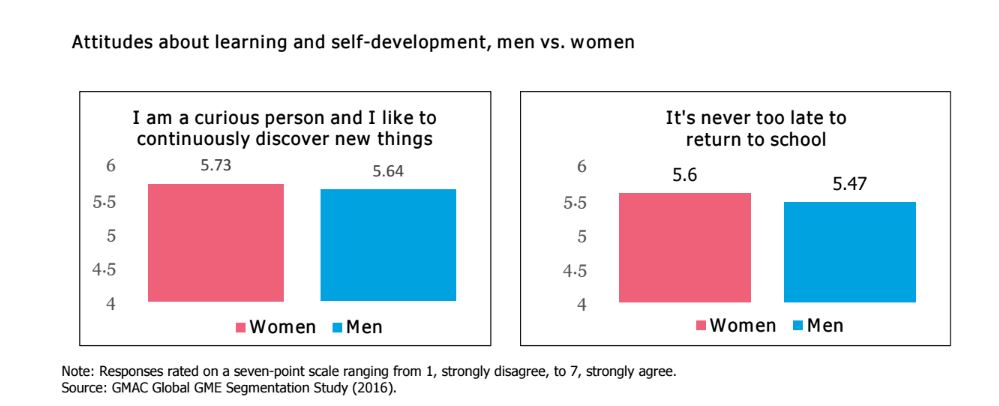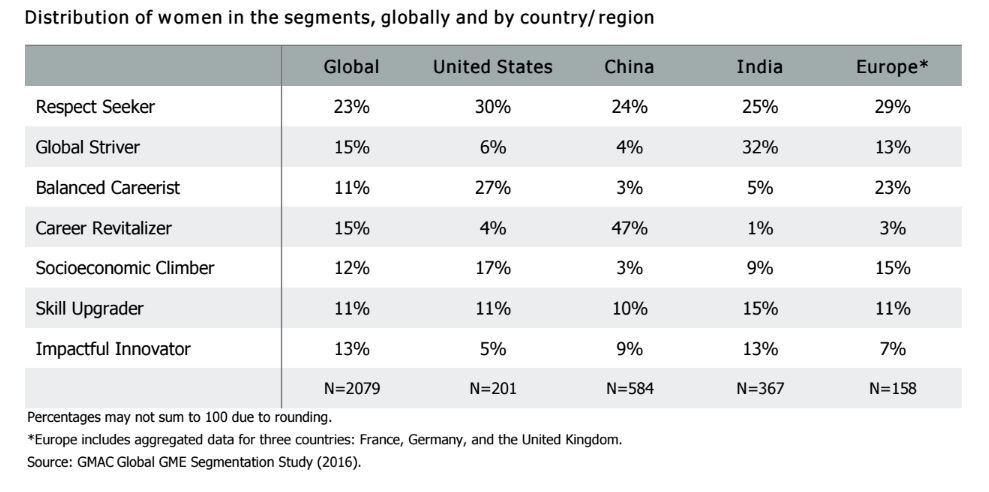What Women Want in an MBA: Financial Aid and Flexibility

Women Are Curious and Feel It’s Never Too Late to Return to School
One of the defining characteristics setting women applying to graduate business programs apart from their male counterparts is curiosity. GMAC found that overall, women are significantly more likely than men to agree with the statement, “I am a curious person and I like to continuously discover new things” and the statement, “I love to learn new things.” Women were also more likely than men to feel that it’s never too late to return to school.

Women Are Planners When It Comes to Their Careers
Another research finding that was borne out by Colby’s personal experience was that women plan the next step in their careers earlier than men. As an undergraduate at the University of Virginia, Colby seriously considered pursuing UVA’s one-year master’s degree in commerce straight out of school. She ended up taking a job at consulting giant Bain & Company instead, but the graduate management education seed had taken root, four years before she would ultimately attend. Her husband, meanwhile, only decided a year before applying that he was interested in law school. “My husband is a little bit less ‘planful,’” she says. “The arc of his thinking about going to law school was much shorter.”
Of course, business and law school are two different things, but the GMAC research revealed similar differences between genders when both were targeting business school. Women in China, Europe and the United States are more likely than men to first start considering an MBA or business master’s degree while in college. This difference is most pronounced among U.S. students, where 27 percent of women start thinking about it as undergraduates, as compared to just 17 percent of men.
Women are also more likely to apply when the timing proves convenient, the research suggests. Here again, Colby’s personal experience tracked closely. “Because my husband is starting law school next year, it was sort of a convenient time for me to be thinking about business school myself,” she says. “It was funny to see that in the data and for that to resonate with my own experience.”
To Colby, both of these findings suggest that deferred admissions programs—such as HBS’s 2+2 Program, the Future Year Admissions Program at UVA’s Darden School of Business and Stanford Graduate School of Business’s MBA Future Leaders program)—have the right idea. “You don’t see many MBA programs offering deferred admissions policies or touting that as an option, but the more flexibility given to women around timelines, the more likely they may be to pursue an MBA.”
Women Are Pragmatists When It Comes to Business School
GMAC also found that women are more likely than men to apply to a specific school because it offers flexible program formats—part-time, hybrid or online, for example—and because its graduates get better job offers. And especially in Western countries, where more women fall into the segments of “Balanced Careerist” and “Socioeconomic Climber,” they are more likely than men to be motivated by the desire to advance more quickly and earn more money.

“At first that was really striking to me,” says Su. “But it all made sense when you started adding all the little pieces together in terms of the need for convenience and flexibility, the practicalities around ‘Can I actually invest this much money in my education?’ and ‘Can I afford to take this much time out of my career?’ and the heightened focus on outcomes,” she continues. “It all comes back to the idea that women are a lot more pragmatic in their approach—and it also explains why the two-year MBA program doesn’t necessarily address all of their needs.”
Indeed, taken together, it becomes much clearer why more women would be drawn to specialized business master’s degree programs, which typically cost less, require less time out of the workforce, offer greater flexibility and fit more conveniently in with other things in women’s lives.
But that is not to say that women don’t see the MBA as relevant and valuable. Quite the contrary, in fact. The data show that women are more likely than men to hold the MBA degree in high regard and see it as opening doors to wider career advancement.
Next Steps for Business Schools
“It’s easy to make the mistake of thinking of women as a monolithic block and to view their lack of parity in MBA classrooms as a failure on the part of business schools,” GMAC President and CEO Sangeet Chowfla says. “The insights in this white paper clearly reveal that women are distinct from men in what they are seeking from their business education experience, and their behaviors differ between countries and behavior types.”
To approach gender parity in MBA classrooms, business schools need to clearly communicate to women how the MBA is a viable investment. But a one-size-fits-all approach doesn’t work, since what motivates women varies by region and behavior type. “Especially for women in Western countries, emphasize that earning an MBA is a way to advance more quickly in their careers, increase their earning potential and achieve their specific goals,” was the guidance the report offered. “For women in India, stress the academic reputation of the school and the job opportunities and global recognition that will come from a degree from the school.”
It’s also important for MBA programs to really consider how they can provide and promote flexible options for women, says Su. “The fact of the matter is that women are more pragmatic—so the question needs to be ‘How do we help promote those MBA formats that allow more flexibility and allow women to balance their careers with the other demands they are juggling?’” Business schools also need to think about how they can provide funding assistance that can overcome what is clearly a top barrier for women, she adds.
As true to her own life as Colby found much of the research—including how pragmatic and outcomes-focused women tend to be relative to men—she’s hoping to draw on, rather than be defined by, the insights during her time at HBS. “I want to approach business school with an open mind. I’m going in with the intention of working in the education sector after I graduate, but I don’t want to be holding so fast to that plan or that desire that I miss out on other opportunities that might arise.”
As for what she hopes business schools will take away, one is just how strong women’s curiosity and excitement to learn is. “You don’t see business schools talking much about all that you’ll get to learn as part of the MBA,” she says. “I think there’s a real opportunity for them to promote—especially to women—just how exciting it is to think about all the things you’re going to learn.” She also really believes financial aid and scholarships will increasingly move the needle for more women. “That was definitely true in my experience.”
This article has been edited and republished with permissions from Clear Admit.
